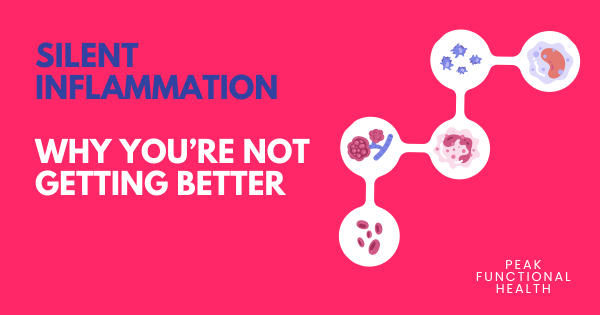Silent Inflammation: Why You’re Not Getting Better

The Silent Root Behind Chronic Disease
In this blog series, we’ve explored three root causes behind chronic disease—genes, digestion, and now, inflammation. These roots influence the chronic symptoms, diagnoses, and conditions we often think of as the problem—when in reality, they’re just the branches growing from deeper dysfunction. Addressing the real causes in Functional Nutrition means supporting the terrain in which these roots grow.
Inflammation: Friend and Foe
Inflammation isn’t the enemy. In fact, it’s a vital part of your body’s natural defense system. When you cut your finger or catch a virus, your immune system sends white blood cells and chemical messengers to the scene to contain the threat, clean up damage, and begin the healing process. This is acute inflammation—and it’s a good thing.
But problems arise when this process doesn’t turn off. When your body stays stuck in “repair mode,” inflammation becomes chronic—ongoing, low-grade, and persistent. This kind of inflammation operates silently in the background, often without the pain or swelling you associate with acute injuries, yet it causes significant damage over time.
Instead of healing the body, chronic inflammation wears down tissues, drains immune resources, and disrupts key systems—fueling the development of a wide range of chronic illnesses.
The Fire Beneath the Surface
Chronic inflammation may be invisible, but its effects are not—and those effects vary from person to person. Each individual’s terrain determines how and where the damage shows up.
Still, it’s been linked to nearly every chronic condition we see today, including:
Autoimmune disorders (e.g., Hashimoto’s, lupus)
Cancer (by promoting tumor growth, spread, and immune evasion)
Cardiovascular disease (atherosclerosis is now understood as an inflammatory process)
Type 2 diabetes, insulin resistance, and obesity
Depression, anxiety, brain fog, migraines, ADHD, and cognitive decline
IBS, Crohn’s disease, and ulcerative colitis
Eczema, psoriasis, and acne
Arthritis and joint pain (any condition ending in “-itis” has inflammation at its core)
Fatigue, allergies, food sensitivities
Thyroid dysfunction and mitochondrial issues
Interstitial cystitis and other urinary issues
This is why inflammation is considered one of the three core roots—it affects virtually every organ system and drives the progression of chronic disease.
What Causes Chronic Inflammation?
Chronic inflammation doesn’t happen randomly. It’s usually the result of a steady stream of irritants and imbalances—many of which are within our control. When repeated insults go unaddressed, the body eventually expresses inflammation through symptoms.
Common contributors include:
Poor diet: Processed foods, excess sugar, refined flours, damaged fats (like industrial seed oils), and an imbalanced omega-6 to omega-3 ratio all create an inflammatory environment. Common food sensitivities—especially gluten and dairy—are frequent hidden triggers.
Gut dysfunction: Leaky gut, dysbiosis, Candida overgrowth, and SIBO all allow toxins and pathogens into the bloodstream, prompting immune overactivation.
Chronic stress: Emotional, mental, or physiological stress raises cortisol and impairs the body’s ability to regulate inflammation.
Toxins and environmental exposures: Pesticides, heavy metals, molds, plastics, and other pollutants burden the immune system daily.
Lingering infections: Chronic bacterial, viral, or parasitic infections can keep the immune system stuck in high alert.
Sedentary lifestyle: Lack of movement slows circulation and lymphatic drainage—both essential for clearing inflammation.
Nutrient deficiencies: Inadequate intake of antioxidants, vitamins, and minerals reduces the body’s ability to resolve inflammation.
When these stressors build up over time—especially in combination with genetic predispositions and digestive dysfunction—chronic inflammation becomes the body's default setting.
Why Inflammation Is a Root Cause
At Peak Functional Health, we don’t treat inflammation as just another symptom—we see it as a core imbalance that must be addressed for true healing to occur. Here’s why:
It’s a root, not just a trigger. Chronic inflammation creates internal conditions where disease can thrive. It disrupts immune responses, damages tissues, and drains the nutrients required for repair.
It multitasks—negatively. Inflammation doesn’t affect just one system. It undermines hormone balance, brain function, energy, and detox pathways all at once.
It blocks healing. Whether you’re dealing with autoimmunity, fatigue, or weight gain, you can’t fully heal a body that’s stuck in an inflammatory state.
That’s why a multi-pronged approach is essential. As a starting place, consider the following:
Remove inflammatory foods
Heal the gut and rebalance the microbiome
Identify and eliminate hidden infections and toxins
Support detox and mitochondrial repair
Replenish key nutrients
Manage stress and prioritize quality sleep
Incorporate movement and lymphatic support
Small, consistent shifts in these areas reduce the inflammatory burden and allow the body to move out of chronic “repair mode” and into real healing.
Takeaway: Cool the Fire, Change the Outcome
Chronic inflammation may be silent, but its impact is profound. Left unaddressed, it fuels the branches of disease. But when you support the body in resolving inflammation, you make room for lasting transformation.
Inflammation isn’t just a reaction—it’s a root. And like all roots, it can be nurtured, supported, and changed by addressing the terrain in which it grows.
Stay in touch!
Subscribe to our newsletter for periodic updates, special offers, and education!
Thank you for subscribing!
Have a great day!